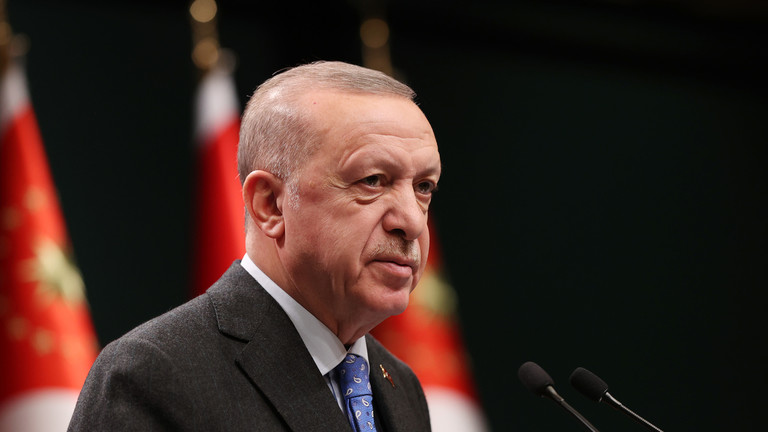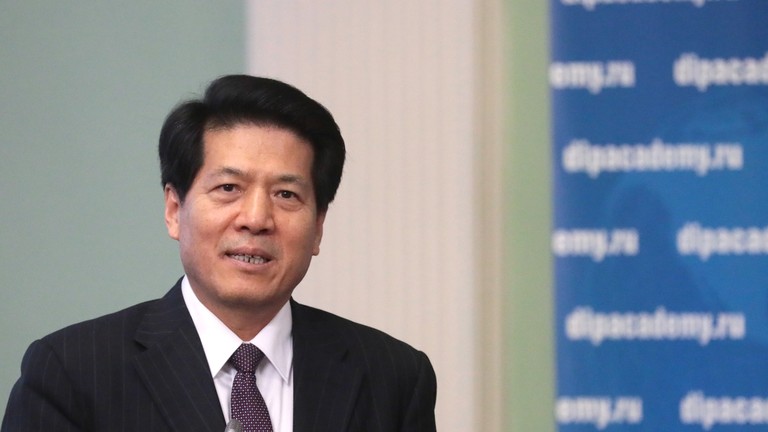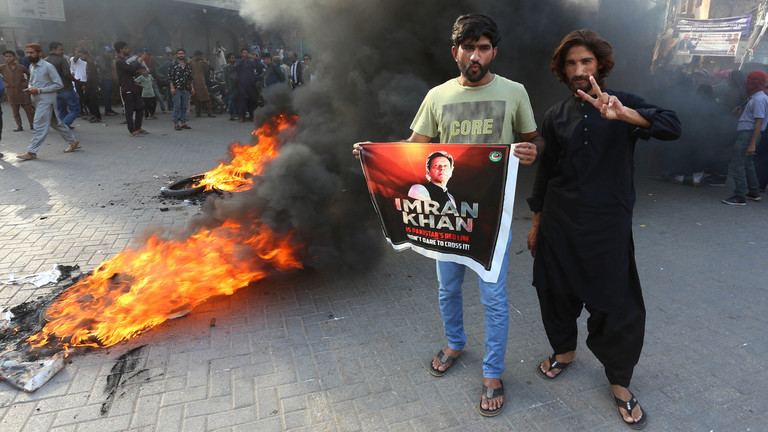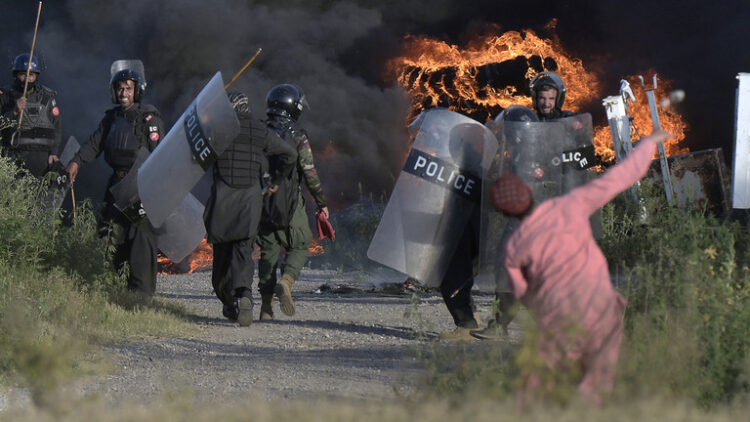PHOENIX (AP) — Gathered at a table in the state Capitol a little less than two years ago, two Republicans and a Democrat took part in a ceremony prescribed by state law that made official Joe Biden’s 10,500-vote victory in Arizona’s 2020 presidential contest.
While sifting through pages, pen in hand and cameras rolling, Republican Gov. Doug Ducey stopped to silence the “hail to the chief” ringtone on his cell phone. It was a call from President Donald Trump, who was in the midst of a frenetic fight to reverse the results of the election he had lost. Ducey continued signing the papers, in what some saw as a dramatic affirmation of democracy at work.
How a similar scene would play out in 2024 if the three Republicans running for the top statewide offices win in November is anyone’s guess. Each has said they would not have signed off on the 2020 results if they had held office at the time. Kari Lake, the Republican candidate for governor, and Mark Finchem, running for secretary of state, have signaled support for vastly overhauling election rules.
Lake, Finchem and Abraham Hamadeh, the attorney general nominee, are running for offices that play a central role in administering or certifying elections and earned Trump’s support by spreading falsehoods about the 2020 election.
“When you have stolen, corrupt elections, you have serious consequences, even deadly consequences,” Lake said in June while she was competing in the GOP primary. “And unfortunately, we had a stolen election, and we actually have an illegitimate president sitting in the White House.”
Multiple reviews in battleground state s, including in Arizona, dozens of court cases and Trump’s own Department of Justice have found there was no widespread fraud in the 2020 presidential election.
Despite that, Republican candidates up and down the ballot continue to deny the legitimacy of Biden’s election. Several are running for governor, secretary of state or attorney general in some of the battleground states where Trump disputed his loss, including Wisconsin, Michigan, Pennsylvania and Nevada.
The possibility of those candidates winning in November raises questions about what they might do regarding elections and certification of results once in office, especially in regard to the 2024 presidential race. Arizona’s candidates for top statewide office offer a window into that possible future.
Election experts say any of the three, if elected, could try to tilt the 2024 election toward Trump if he runs again for president. That could happen through a refusal to certify an election he loses or long before that through pre-emptive changes to the election process.
Arizona has a recent history of extremely close elections, so small changes to its election laws could have a huge impact on the outcome and reverberate nationally.
The Republicans say they’re motivated by boosting faith in elections, not returning Trump to power or helping his allies.
For her part, Lake said last month that she would certify the 2024 election if courts did not substantiate any official election challenges. That answer runs counter to her message through much of her campaign, when she said she would not have certified the 2020 results despite courts rejecting all challenges.
Finchem said in a text message that he would certify the election “as long as all lawful votes are counted and all votes cast are under the law.” He did not respond to follow-up questions about who decides if the votes were lawful or whether he would accept results of court proceedings.
Hamadeh said in a statement that he would “faithfully follow the law.”
The governor, secretary of state and attorney general in Arizona wield enormous power over election decisions big and small. If all three win, the steps they could take would be nearly limitless, according to Arizona election attorneys deeply versed in the laws, rules and norms that govern the process.
They could rewrite the state’s elections procedures manual, a tome laying out in minute detail the rules for conducting elections and certification. It’s written by the secretary of state and must be approved by the attorney general and governor. If all three sign off, the changes carry the force of law.
That’s even without any of the more expansive changes that could be made by a Legislature that is almost certain to be controlled by Republicans.
“If you have people who are supportive of the Big Lie in charge of our elections, there’s a lot of stuff they can do,” said Jim Barton, a longtime Democratic election attorney in Arizona. “And they can do it in ways that look pretty boring.”
Finchem, who was outside the U.S. Capitol on Jan. 6, 2021, but says he did not join rioters who attacked the building that day, has vowed to rewrite those rules. He’s said little about what he would change.
He could create rules for accepting voter registrations, eliminate the right for county officials to provide drop boxes to accept mail ballots, and even refuse to accept filings for voter initiatives, just to name a few, Barton said.
On registration alone, the secretary could adopt small changes, such as when forms need to be turned in or the color of ink that must be used, and pass them off as needed to make processing easier, Barton said. Small changes affecting comparatively few voters could add up in a close race.
“Nobody’s winning the elections anymore by 10%,” Barton said. “So you don’t have to say, ‘Oh, I’m not going to count any of the votes from Pima County’ to sway the vote. If you make it a little bit harder for low-income people to vote, then the state’s not purple anymore.”
And that’s just the start if someone really wants to seize the reins of election rules and make small but substantive changes.
Eric Spencer, an attorney who represents Republican and conservative organizations and is a former state elections director, said a slew of rules could be changed under a new administration.
That could include eliminating unattended ballot drop boxes, which are convenient spots for voters to turn in their ballots. The trio also could pursue changes to rules for ballot-counting machines and the election canvass, in which elected leaders certify the results, Spencer said.
That’s where “a new triumvirate could make some radical, radical changes,” he said.
For example, a new secretary of state could remove a provision Spencer developed that says county and state officials must certify the election results and can’t change the vote totals. Spencer developed that rule after a county official balked at certifying a local election in 2016 and nearly derailed the statewide certification.
Any controversy over certification could create a pretext for Arizona’s electoral votes to be challenged when Congress meets to count them in early 2025.
As secretary of state, Finchem also would have unilateral authority to certify — or not — election equipment. He told CBS News that vote tabulating machines should be banned unless the manufacturer shares the source code.
No voting system manufacturers release the underlying software for their systems to protect code they regard as proprietary and to prevent hacking. Finchem and other Trump allies claim they can’t trust the systems if they can’t review the software that powers it line by line.
Lake and Finchem also both signaled they want to ensure that voting rolls are accurate, which election experts worry could lead them to purge certain voters or force people to continuously re-register.
“We must protect the count of all legal votes and quarantine votes that are outside of the law,” Finchem said.
Lake, who has emerged as one of the most popular new figures in Trump’s “Make America Great Again” movement, has avoided disclosing specific changes she would pursue for elections. But she’s offered clues.
She has said she wants Arizonans to go to bed on election night knowing the results, which some regard as a threat to the mail balloting system used by the overwhelming majority of voters.
“I’m going to work with the lawmakers to make sure we have a system where voting is honest,” Lake said. “I’m not sure what it’s going to look like.”

 NEWS5 months ago
NEWS5 months ago
 NEWS5 months ago
NEWS5 months ago
 NEWS5 months ago
NEWS5 months ago
 WAR5 months ago
WAR5 months ago
 FINANCE5 months ago
FINANCE5 months ago
 INVESTMENTS5 months ago
INVESTMENTS5 months ago
 FINANCE5 months ago
FINANCE5 months ago























